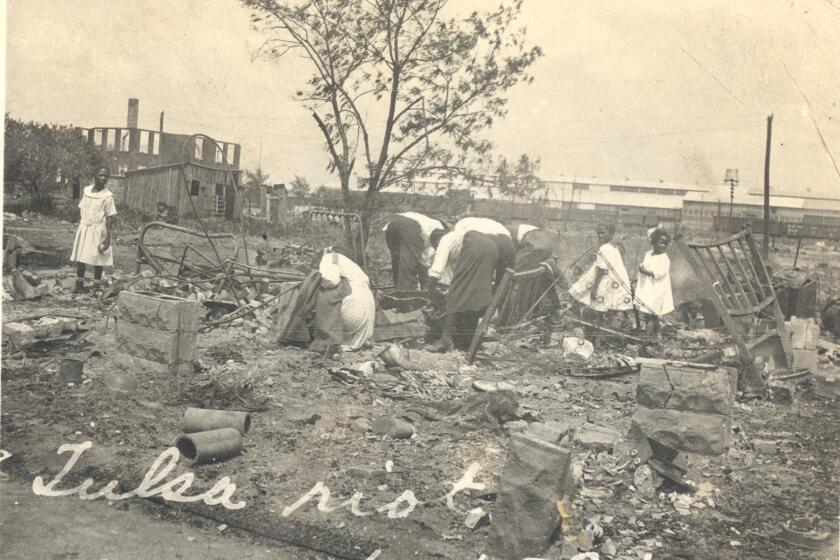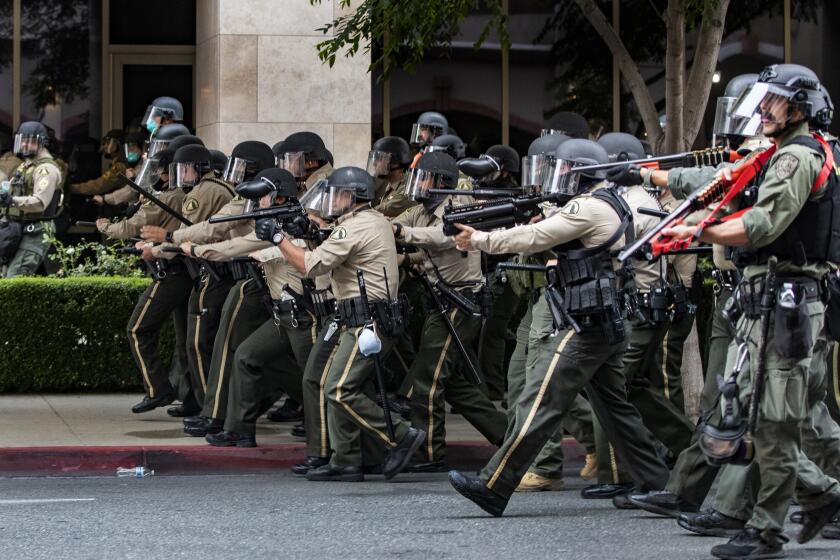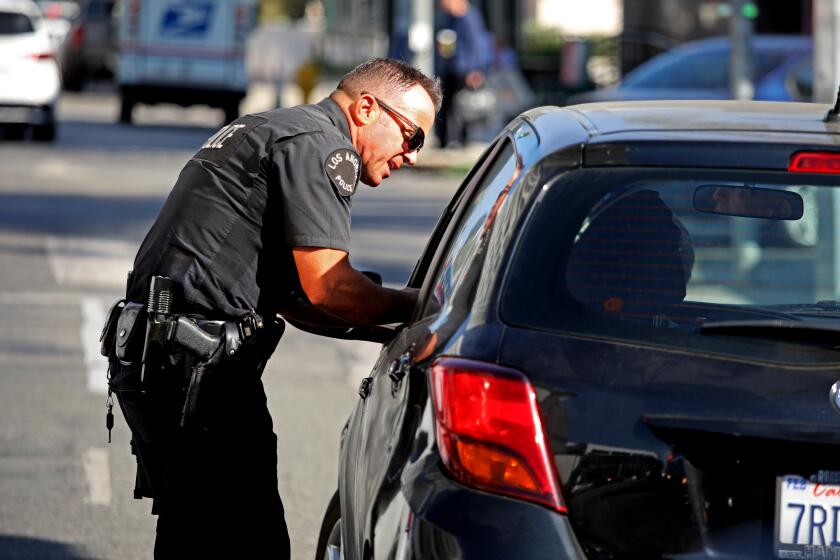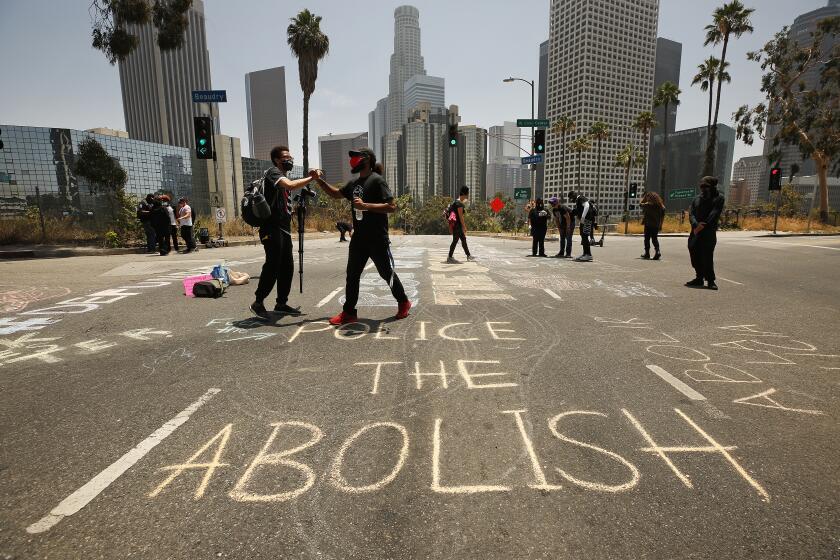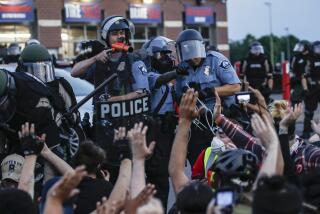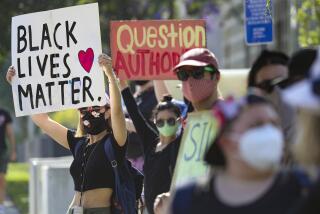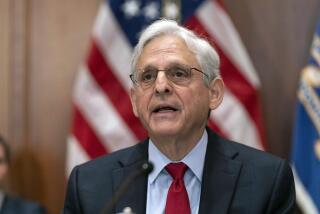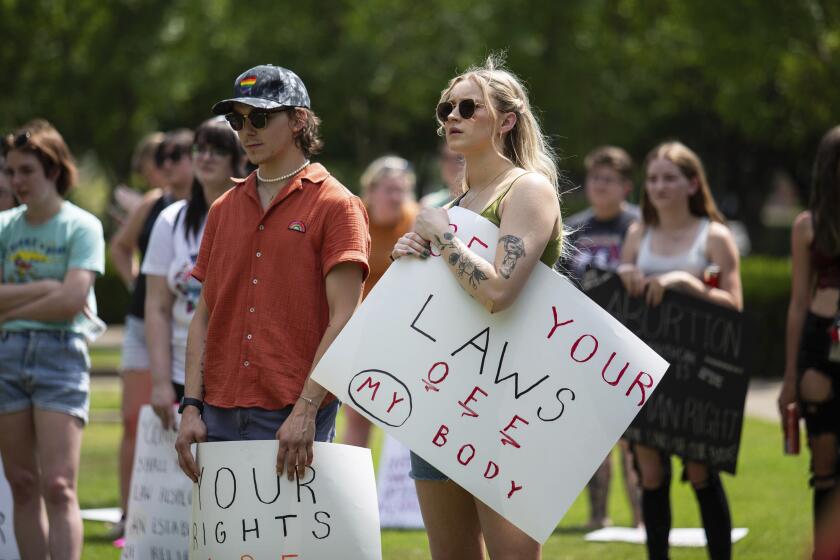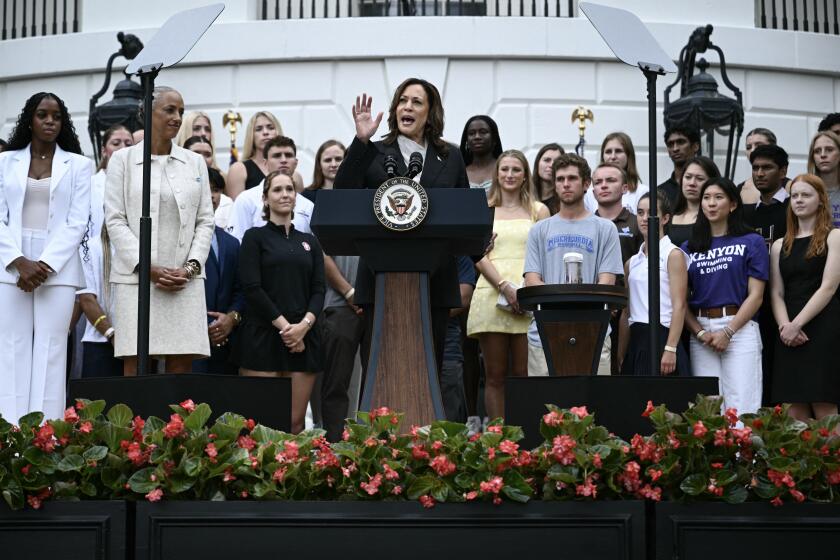Editorial: Four years after George Floyd, the backlash is underway

Four years after George Floyd was arrested and murdered by Minneapolis police, the nation is in the midst of a backlash movement that is trying to rewrite the narrative, the legacy and even the facts of the killing.
Call it the anti-reckoning. And it’s a disturbing sign of how hard-fought progress on policing and racial justice reforms are under attack by powerful and entrenched interests.
Floyd, a Black man, was taken into custody at around 8 p.m. on Memorial Day, May 25, 2020, after police received a call reporting someone trying to pass a fake $20 bill. Officer Derek Chauvin kneeled on Floyd’s neck despite Floyd’s anguished cries that he was unable to breathe. After 9? minutes, Floyd was dead.
The Times Editorial Board examines the reckoning of the last year and considers what it means for policing and protest in Los Angeles and elsewhere.
The killing sparked months of protests against police brutality and racism in American society, especially in the criminal justice system. The demonstrations were not unprecedented; widespread protests had marked the earlier killings of Black men and boys: Trayvon Martin in Florida, Eric Garner in New York, Michael Brown in Ferguson, Mo., and many others. And there had been blatant acts of white supremacist blowback including the mass slaughter of Black churchgoers in Charleston, S.C., in 2015 and the ugly Unite the Right rally in Charlottesville, Va., in 2017.
But anxiety over the COVID-19 pandemic and weeks of lockdowns had turned the nation into a pressure cooker. With the Floyd murder, it exploded.
In statehouses and city halls, lawmakers began considering in earnest the role of race and racism in policing and public safety. Long-delayed discussions of unarmed response to incidents involving mental illness and drug-related behavioral problems finally got on track. New laws were passed to clear court proceedings of racial inequities. Voters continued the trend of electing a new breed of prosecutors who put the quest for justice ahead of demanding the longest possible sentences.
Editorial: Lots of talk, still too little change to policing three years after George Floyd’s murder
The 2020 killing in Minneapolis ignited a summer of protest and debate about the role of police, but little constructive action. But there are some promising developments.
Even corporate America briefly got on board. Companies promised to pay billions of dollars to combat systemic racism.
The shift in attitude and policy was labeled the racial reckoning.
In law and policy there have been a few lasting advances, such as banning deadly police chokeholds in some jurisdictions that still allowed them, and compiling data that show the extent to which race affects policing practices.
But in Congress, the George Floyd Justice in Policing Act, which would have incentivized broad police reforms, was rejected twice on mostly party-line votes.
Racism taints every stage of death penalty proceedings in California, as the state Supreme Court should acknowledge. It’s present in other criminal sentences as well.
In Los Angeles and most other jurisdictions, officials have failed to move unarmed response beyond the pilot stage, and they’re still talking about alternatives to police only for traffic and parking infractions. The county’s Care First plan to realign response to lower-level crimes from jail to healthcare, treatment and other social services agencies is moving at a snail’s pace.
Police unions, traditional prosecutors and conservative politicians have taken advantage of the slow movement of reform and fears of crime, real and imagined, to push back not only on post-Floyd reforms but those adopted over the previous decade. In California that means yet another assault on Proposition 47, this time falsely blaming it for homelessness.
Police at first broadly criticized Chauvin as a bad cop in an otherwise flawless system. The “bad apple” theory formed the basis for opposition to the George Floyd Justice in Policing Act and other reforms.
Then came challenges to the facts of Floyd’s death. Far-right commentators assert that Chauvin didn’t actually kill Floyd at all, but instead arrested a man already dying of a fentanyl overdose. The officer then was supposedly set up by a corrupt criminal justice system out of fear, or in thrall, of Black Lives Matter.
Armed police should not enforce minor vehicle and traffic violations. Los Angeles should move forward its long-stalled reform plan. State lawmakers should act as well.
This nonsense has been thoroughly dissected and disproven, but it remains an article of faith among a certain core of conspiracy theorists who appear to believe that prosecutors, judges and juries were corrupted and imprisoned an innocent man. The irony in this line of thinking is head-spinning: This justice system supposedly operated for years without a taint of the racism against which hundreds of thousands of Americans had been protesting, until a white police officer was put on trial for killing a Black man. Then, suddenly, the system became untrustworthy and illegitimate.
There has also been a steady effort to redefine the protests as gang violence or even insurrection, as a kind of defensive projection by defenders — including former President Trump — of the Jan. 6, 2021 mob assault on the U.S. Capitol to block certification of Joe Biden’s election to replace Trump.
It is quite true that the Floyd protests of 2020 were pockmarked by arson and property destruction, resulting in losses of more than $1 billion. None of that is OK.
One response to George Floyd’s death was rejection of police reform, which, opponents argued, only perpetuates a racist system. Still, reform is needed.
But the claim that the perpetrators acted with impunity while the Jan. 6 attackers are being imprisoned is demonstrably untrue. Thousands of people have been arrested and criminally punished, including with prison, for acts that crossed the line from protest to crime. In fact, analyses show that people arrested for 2020 offenses were sanctioned unusually harshly.
The ongoing battle between the George Floyd reckoning and the anti-reckoning blowback is a battle over the role of truth in our society and its institutions. But if we believe facts are real, and independent from ideology and political power, we must acknowledge that what happened to Floyd was real, horrid and unjust. And that it wasn’t a one-off, but an example of a flaw in our criminal justice system that must be remedied.
More to Read
A cure for the common opinion
Get thought-provoking perspectives with our weekly newsletter.
You may occasionally receive promotional content from the Los Angeles Times.
